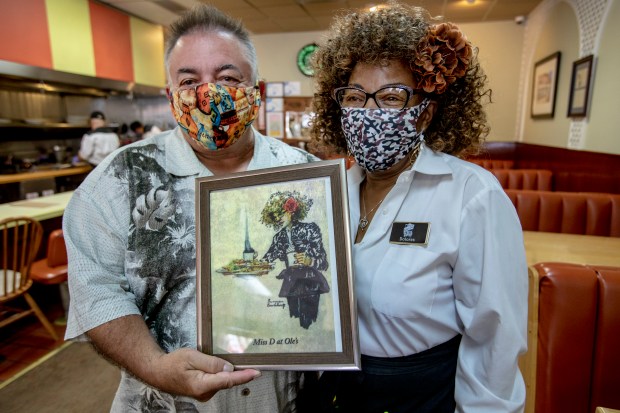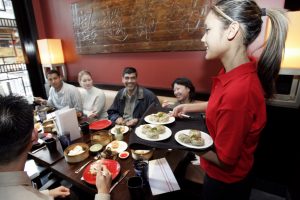ALAMEDA — Ken and Vickie Monize dreamed of retiring next year. After working seven days a week for decades at their family-owned diner — Ole’s Waffle Shop — they bought a flat lot in a Santa Rosa subdivision with a view of soaring redwood trees behind the back fence.
Architectural plans were already drawn up for a one-story ranch house and swimming pool. They promised each other they would learn to relax — yet still keep an eye on the business.
Then the pandemic struck. Like restaurants coast to coast that have been crushed by coronavirus shutdowns, the second-generation owners of this landmark diner that predates the Great Depression and routinely drew long lines for pecan waffles and fresh-squeezed orange juice lost 85 percent of their revenue. Who orders breakfast to go?
But the Monizes made a stunning decision to retain all 41 employees — whether they had work for the loyal cooks, servers and busboys or not: They sold their dream property to make payroll.
“Our staff is more important than a retirement home,” said Ken Monize, 61, sitting next to Vickie in the corner booth as the smell of bacon-to-go wafted through the empty restaurant. “Their families depend on us and I take that responsibility very seriously. I’m not going to let them down. I refuse to do it.”
Around the Bay Area and across the country, the suffering and sacrifice brought on by COVID-19 has been incalculable. As coronavirus cases continue to spread at record levels, neither lives nor livelihoods have been spared. The flip-flopping directives from state and local governments about who can open, when and how have only made things worse.
“It’s really unfair to a lot of these small businesses that they’re getting jerked around,” said Rufus Jeffris of the Bay Area Council business association.
In the last two weeks, Alameda County allowed restaurants to open for outdoor dining, then closed them, then opened them again. The paint was barely dry from restriping Park Street to allow more room for outside tables before they were pulled back that very evening.
Across the street from Ole’s, business is down drastically at La Penca Azul as well. Octavio Guzman, whose family has owned the sprawling corner restaurant since 1987, is worried he won’t be able to make it. Monthly rent alone is $35,000. He’s had to lay off 75 of his 99 employees.
“I wish I could employ everybody back,” Guzman said. “I have people calling me every day wanting their jobs back. I rehired a few waiters to pack food to go. That’s all we do.”
Over the past four months, the Monizes say they have spent nearly $400,000 of their own money to keep Ole’s in business and retain every single employee, some of whom have worked for them for decades. They have celebrated weddings together, and children’s birthdays. How could they let them go? The $220,000 loan they received from the federal government’s payroll protection program only covered two months of wages and none of the other expenses to run the restaurant.
If there was any doubt about the Monizes’ devotion to their employees before their grand real estate sacrifice, just look at the walls. They are lined with painted portraits and ink sketches of longtime workers. There’s an image of Juan Salto refilling the napkin holder, Joaquin Magdaleno cooking home fries on the griddle and busboy Luis Alvarez holding two pots of coffee, regular and decaf.
The drawing of Dolores Jeanpierre, 69, who’s waited tables here for 42 years, features a stack of breakfast plates up to her elbow and a big red flower tucked behind her ear, the kind she likes to wear every day. Before the pandemic, artist Nancy Crookston was a regular with her husband, Garr.
ALAMEDA, CA – JULY 16: Ken Monize holds a painting of waitress Dolores Jeanpierre at Ole’s Waffle Shop in Alameda, Calif., Thursday, July 16, 2020. Monize runs the 1927-era family restaurant on Park Street where Jeanpierre has been a server for 42 years. (Karl Mondon/Bay Area News Group)
“They split the early bird special with eggs poached medium and wheat toast with blackberry jam,” Jeanpierre said. “She brings in a tea bag from Costco and he drinks coffee.”
Ole’s is “in my blood,” said Jeanpierre, whom customers know as “Miss D.” She had just memorized the names of all 14 men who had started taking over the back table on Friday mornings when coronavirus struck.
“We had Frank, Sean, Mr. Wally, Billy,” she said, starting down the list. “I miss all those guys. Even if they were strangers I would give them a hug.”
Without employees like Jeanpierre, Monize says, “all we have is a name on the door.”
These days, no one fills the orange vinyl booths along the wall or sits at the long yellow counter with swivel seats watching the white-hatted cooks at the griddle. Monize pays some of the veterans $80,000 a year. He trusts them with the recipe for their signature waffles, which dates back to 1927 and is kept in the safe.
“They’re worth it. They work hard. They’re exhausted when they go home,” Monize said. “This is not a restaurant that makes huge profits and puts it in our pockets. This business is designed to pay the employees, keep a little for ourselves and break even.”
He and his wife haven’t taken a salary since March.
 ALAMEDA, CA – JULY 16: Ken Monize talks about the challenges he and his wife face trying to operate Ole’s Waffle Shop in Alameda, Calif., Thursday, July 16, 2020. The couple continues to employee their entire crew as they fight to keep the 93-year-old business going during the pandemic. (Karl Mondon/Bay Area News Group)
ALAMEDA, CA – JULY 16: Ken Monize talks about the challenges he and his wife face trying to operate Ole’s Waffle Shop in Alameda, Calif., Thursday, July 16, 2020. The couple continues to employee their entire crew as they fight to keep the 93-year-old business going during the pandemic. (Karl Mondon/Bay Area News Group)
Federal programs have helped. Not only have many small businesses like Ole’s — pronounced “Oh-lee’s” for its Swedish founder Ole Hansen — received forgivable federal loans, but many laid off workers are receiving an extra $600 a week — at least until the end of the month — in their unemployment checks. For service workers who qualify, some can make more on unemployment than in their previous jobs.
But you won’t find anyone complaining at Ole’s.
“I’m so grateful,” said Alyssa King, 30, who manages the “Wine and Waffles” bar next door that the Monizes also run. “It’s a big amount of security in a very scary time.”
 ALAMEDA, CA – JULY 16: Dolores Jeanpierre takes a phone order at Ole’s Waffle Shop in Alameda, Calif., Thursday, July 16, 2020. Jeanpierre has worked at the 1927-era family restaurant for 42 years. (Karl Mondon/Bay Area News Group)
ALAMEDA, CA – JULY 16: Dolores Jeanpierre takes a phone order at Ole’s Waffle Shop in Alameda, Calif., Thursday, July 16, 2020. Jeanpierre has worked at the 1927-era family restaurant for 42 years. (Karl Mondon/Bay Area News Group)
It was Vickie’s parents, Bob and Christie Adams, who purchased Ole’s Waffle Shop in 1972 from the founder. Vickie has been working here since she was 17. Decades ago, they uncovered the original Art Deco neon sign out front that had been hiding for years behind a newer plywood sign. At night, above the striped awning, it still glows: “Steaks * Hot Cakes * Waffles * Hamburgers.”
Brass nameplates of some of their most beloved regulars grace the table edges. When some of the old-timers have died, family members have sent memorial cards to the diner. When a former waitress turned 100, the Monizes sent custom-made Ole’s aprons and mugs and called her on the phone.
“It’s so emotional. It’s so personal,” Vickie said, wiping her eyes. “Ole’s is a key part of me. Without it? I don’t know.”
 ALAMEDA, CA – JULY 16: Vicky Monize talks about the challenges she and her husband face trying to operate Ole’s Waffle Shop in Alameda, Calif., Thursday, July 16, 2020. The couple continues to employee their entire crew as they fight to keep the 93-year-old business going during the pandemic. (Karl Mondon/Bay Area News Group)
ALAMEDA, CA – JULY 16: Vicky Monize talks about the challenges she and her husband face trying to operate Ole’s Waffle Shop in Alameda, Calif., Thursday, July 16, 2020. The couple continues to employee their entire crew as they fight to keep the 93-year-old business going during the pandemic. (Karl Mondon/Bay Area News Group)
After outdoor dining was restored Wednesday, Marty Torres sat at a sidewalk table relishing his eggs, home fries and perfectly cooked bacon, which he picked up with his hand to admire its impressive length and caramel color. He’s been coming here since he brought his kids after soccer practice for “breakfast at dinnertime.”
“I had a real rough week,” Torres said, “and this just brings me home.”
Ken Monize is still bewildered by rules that allow Costco and Walmart to welcome hundreds of customers into stores, but don’t allow indoor dining despite the strict sanitation regimen he keeps just for his own employees, whose temperatures are taken and logged twice daily.
If outdoor dining isn’t yanked back again, he said, he might just make payroll. But with COVID-19 cases on the rise and whipsawing rules to contend with, he’s not so sure. Whether the Monizes will ever be able to build a retirement home is another uncertainty, and a particular blow to Vickie’s mother. She lives with the couple and was looking forward to a bedroom with doors straight out to the swimming pool.
“We’re struggling,” Monize said. “Ninety-three years in this community and I don’t know how much longer we’re going to be able to hang on. At some point you run out of money and property to sell. And what do you do?”



















